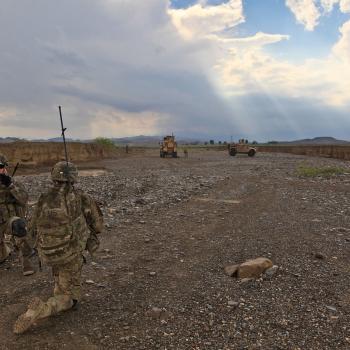Monday: Read Luke 3:1-4:13
As we noted, the Gospel of Luke was written by Luke, who was likely a Gentile, and it was written Theophilus, who was most certainly a Gentile. With this in mind, Note the message of John the Baptist. His message is much stronger in tone in Luke than in the other gospels. He begins by calling them a “brood of vipers” (i.e., children of snakes; 3:7), which certainly alludes to Genesis 3.
John demands “fruits in keeping with repentance” (8). He warns them not to rely on their lineage (8; i.e., just because you are a descendant of Abraham does not mean that you are a member of the covenant. To be a member of the covenant requires repentance.)
Each group (“crowds: 10; “tax collectors”: 12; “soldiers”: 14) asks John what repentance looks like. He replies that they must give to those who lack the basic necessities, and soldiers should not use “force” or “accuse anyone falsely” (14). John’s answers accord with the prophetic concern for the poor and the marginalized. The soldiers held all power and any accusation meant that the accused was in jeopardy.
John denies that he is the Messiah and affirms that One coming after him will “baptize you with the Holy Spirit and with fire” (16). This certainly looks forward to Acts 2:1-4.
Luke notes that Jesus was 30 when He began His ministry (23). The significance of this is that David was 30 when he began his reign (2 Sam 5:4). This reminds us of Luke’s stress that Jesus is the new Davidic King!
Like Matthew, Luke includes Jesus’ genealogy, but he begins with Jesus and winds his way backward to Adam who was “the son of God” (Gen 5:1-3; also used for Israel: Exod 4:22; Hos 11:1; now it is used for Jesus). The title, “son of God” depicts Jesus as the true humanity!
The temptation (4:1-13) confirms that Jesus is the obedient Son (Israel). Jesus does what Adam could not do—resist the devil. That Jesus is in the wilderness (1) contrasts Israel’s failure in the wilderness (note the 40 days parallels Israel’s 40 years).
Three times Jesus quotes Scripture in His reply to the devil and each time it is from Deuteronomy where Moses responds to Israel’s failures (Deut 8:3; 6:16; 6:13). Thus, Jesus succeeds where Israel failed.
Behind the temptations is the question as to whether or not Jesus would establish His kingdom at the behest of Satan (6-7), or the Father. It seems like a no-brainer, but Jesus knows that the Father’s way is one of suffering.
Questions to ponder/discuss:
- Read Isa 1:10-20; 58:6-7; and Ezek 18:7-8 and compare to the message of John the Baptist. What do you think John the Baptist would say to your church or Christians in your community? What would he say to you?
- Jesus rejected Satan’s offer and chose the way of suffering. How much of our experiences are an effort to work around suffering?
Tuesday: Read Luke 4:14-44
Luke introduces Jesus’ public ministry in a typical Lukan way: Jesus was “in the power of the Spirit” (14). Today’s reading breaks down into two sections: in 4:16-30 we have an example of Jesus’ teaching in synagogues. And in 4:31-44 we have an example of Jesus’ healing and serving ministry.
The scene in the synagogue in Nazareth is crucial for Luke. Several of his major themes are presented here.
First, Luke notes that Jesus cited Isa 61:1-2a and proclaimed that He was here to fulfill it. Luke presents this passage in order to set forth several of his major themes. For Luke, Jesus came to preach: good news to the poor, release to those who were captives, give sight to the blind, free the oppressed, and proclaim the year of Jubilee (18-19).
The people certainly heard the first part of Isa 61:1 (“the Spirit of the Lord is upon Me”) and concluded that Jesus is claiming to be the Messiah. After all, the one who is anointed by the Spirit must be either the king or the priest. The people do not reject Jesus though. In fact, Luke says that they spoke well of Him (22). More than anything they were amazed that the Messiah was one of their own—Joseph’s kid (22)! (Note many who were there would have been related to Jesus. Nazareth was a small village of maybe a few hundred).
They do not reject Jesus until He compares His ministry to that of Elijah and Elisha: both of whom were sent to the Gentiles (26-27)! This means that Jesus was both comparing those in Nazareth to the faithless in Israel and that He has come to include Romans (i.e., the nations).
The chapter concludes with Jesus performing some miracles that confirm His claims (38-44). When finished, Jesus says, “I must preach the kingdom of God to the other cities also” (43). Note that Jesus didn’t preach anything in 38-44. What, then, does He mean by “also”? For Jesus, doing the miracles of the kingdom is to preach the kingdom.
Questions to ponder/discuss:
- What relationship do you believe exists between “doing the kingdom” and “preaching the kingdom”? What does “doing the kingdom” look like for you?
- What relationship do you believe exists between miracles and kingdom today?
Wednesday: Read Luke 5:1-28
The readings for the next two days will set up the reading for Friday. From 5:1-6:19, Jesus is calling His disciples and gathering them, and confronting the religious leaders.
Jesus’ disciples are not what we would expect for a Rabbi. They were not aspiring theologians: not even close. The key to understanding the call scenes is to note the repetition of “they left everything and followed Him” (11) and “he [Levi] left everything behind, and rose and began to follow Him” (27).
Jesus’ acts bring Him into conflict with the religious leaders.
NB: be careful to not immediately consider the religious leaders (esp the Pharisees) as the bad guys. Certainly, the conflicts with Jesus were intense and they did lead to His crucifixion. At the time, however, they were well-respected and considered models of piety. The Pharisees believed it was their responsibility to protect the Torah. And they wanted to protect the people from the harm that would come from Rome if another messianic pretender arose (and there were several such pretenders before and after Jesus that led to the wrath of Rome upon the people). Jesus’ conflict with them, though certainly complex, revolves largely around the issues of caring for the poor, the oppressed, and the outcasts. Jesus did not seem to be leading a movement that would successfully overthrow Rome.
Questions to ponder/discuss:
- One of the common mistakes that all Christians make (and I do think we all do it) is that we read the Bible and think that we are the good people so we must be on “team Jesus” and those Jesus comes into conflict with must be “team bad people.” What if we read these stories as though maybe we are also needing to learn from Jesus right now and change our ways?: i.e., maybe I am not on “team Jesus” as much as I think I am
- As you read through this passage (and I would say the rest of Luke also), ask yourself, “what are some things that Jesus is saying or doing here that if my pastor or Bible study leader said or did, I might not be too happy?” (e.g., imagine if he/she forgave someone’s sins; or hung out with the wrong people—at a bar or was eating with gang members; or told you to forgive a person’s debts against you?)
Thursday: Read Luke 5:29-6:19
The conflict with the religious leaders in Luke reaches a tipping point in Luke. Jesus is eating with the wrong people (29). Luke notes that the Pharisees “began grumbling” (30). The word “grumbling” is important. The word is the same as used in the Greek of Num 14:27 where it is used to depict the faithless Israelites who have been brought out of Egypt.
Jesus explains that their old ways of thinking must be put aside for the new wine/new garment (36-39) that He is bringing. Jesus does not mean that He is replacing the Old Testament teachings with something new. Instead, He is proclaiming that they have adapted the old with the ways of the world, and He has come to fulfill Isa 61:1-2 (4:18-19) and to bring about the justice that God has always planned.
This is very significant for our understanding of Luke (or Jesus, or Paul, or Isaiah, etc.). The way the world’s kingdoms (which Satan offered Jesus: 4:5-6) function leads to injustices and the oppression for the many while the few live in abundance (see 16:19-31 if you want to look ahead). Their old ways of thinking about power and economics and civil society do not work. They must “repent” of those ways and drink the new wine that Jesus offers. What is that “new wine” or that new way of doing things? We will learn this in tomorrow’s reading.
Note: tomorrow’s notes may be a bit longer, but they are crucial to understanding Luke.
Questions to ponder/discuss:
- We probably cannot stress enough that the reason why Jesus comes into conflict with many, and the reason why so many did not understand what He was saying, is because they had come to accept society’s (which for them was Rome; but for us, it is whatever empire we live in) ways of doing things. For Jesus, those ways of doing things do not create justice for everyone. In fact, they further injustice—especially for the marginalized. Thus, the challenge for us, then, as we prepare for tomorrow’s reading, is to continue to seek the Lord so that we too can get rid of our old wineskins if needed, and to receive the new wine Jesus offers. This might sound simple, but Jesus’ words remain profoundly revolutionary.
Friday: Read Luke 6:20-49
This is the central section of Jesus’ teaching in the Gospel of Luke. I am glad that it came on a Friday so that you can have the weekend to reflect on it. This section serves as Luke’s version of the Sermon on the Mount (as found in Matt 5-7). For Luke, the teaching of Jesus comes down to “love” (27, 32, 35). It is Jesus’ definition of love, however, that was, and still is, revolutionary.
Luke begins with Jesus’ “blessings” and “woes.” They are presented in two contrastive sets of four:
– Poor, hungry, weeping, and persecuted (20-23)
– Rich, full, laughing, and liked (24-26)
Note that the fourth groups reflect the way the “prophets” (23) and the “false prophets” (26) were treated.
One commentator states that Jesus isn’t just about blessing the poor, He is about changing systems so that the poor are no longer poor!
In order to grasp the significance of Jesus’ teaching here, it is critical to understand the Roman system of patronage.
(This will be addressed in the Determinetruth podcast 3/22/22; or 22/3/22 for our international friends!).
In this system, everything one does is in order to advance your own well-being. For the poor (approximately 90% of the population), this meant trying to survive another day. For the elite (maybe 3% of the population) this meant acquiring more wealth and power.
Because the system was based on reciprocation (you do this for me and I’ll do that for you), one only gave to or served those who were able to pay you back or grant you some favor—like a job or more honor. Thus, you would not lend to the poor because they could not pay you back. You would not give to the poor because they could not offer you work in return for your gifts. As a result, everyone aimed to serve the wealthy in order to secure their favor. And no one did so for the poor or marginalized. (Note: the “poor” included anyone who is marginalized: e.g., the widow, the lame, the tax-collector)
When Jesus defines love, it is in the context of this inequitable system that advantaged the rich and made the poor even poorer.
NB: meals were a major part of this system because where one sat at the table demonstrated where one sat socially. Needless to say, the poor were not invited to such meals because they could not afford to host a meal in return or give the host any social advantage—in fact, the presence of the poor brought down the honor of the host. This is why most of the stories in the Gospel of Luke take place at a meal!
Jesus gives four illustrations of what His command to love looks like. He says,
- Love your enemies (27)
- Do good to those who hate you
- Bless those who curse you (28)
- Pray for those who mistreat you
When Jesus adds, “Give to everyone who asks” (30), we must recognize the revolutionary nature of this command. Of course, those who were asking for something were the poor. Those listening to Jesus had to have been thinking, “why would we do that?” Their thought would be along the lines of, “what good does that do me?”
The problem with this system (and we need to recognize that it was not just the Roman system, but all systems run by humanity—wait until we get to the book of Revelation) was that it was set up to guarantee that the rich became richer and the poor became poorer. Jesus comes along and says, “no more!” “In my kingdom, everyone will have at least what they need!
Note: this is what God intended when the covenant states: “there shall be no poor among you” (Deut 15:4).
Jesus, then, adds that when we love like this, we will be children of “the Most High” (35). That is, when we love everyone regardless of whether it benefits us or not, we are acting like God. If we think about it, everyone by definition is lesser than God, Yet God loves everyone.
Finally, note that Jesus’ words about receiving according to one’s standard of measure (38) affirm that, for Jesus, love has economic consequences (“a good measure” refers to fairness in measuring grain in the marketplace). We might summarize Jesus’ words as such: “if your love for the other extends to being fair in business, even if it hurts your bottom-line, then God will be fair with you.”
Questions to ponder/discuss:
- Does Jesus’ command to love our enemies mean that we have to agree with them? Endorse them? Like them? Respect them?
- How might Jesus’ command to love your enemies extend to someone who has entered your home in order to steal?
- What does Jesus’ command to love everyone mean for how you approach political discussions? What about your political views?
- Can Jesus’ ethic of love for your enemies work for a nation?
NB: My goal is to keep these posts free of charge. I do not intend to ever hide them behind a paywall. I can only do this if those of you who have been blessed by them and can afford to give ($5, $10, $25, or more/month) do so. You can give a tax-deductible contribution by following this link.
Please share this post and let others know about determinetruth.
[1] This guide is meant to be done either as a group study over the course of 2 or 4 meetings (Day 1-5; 6-10; 11-15; 16-20), or as a private devotion over the course of 4 weeks (or a calendar month—5 lessons per week).












